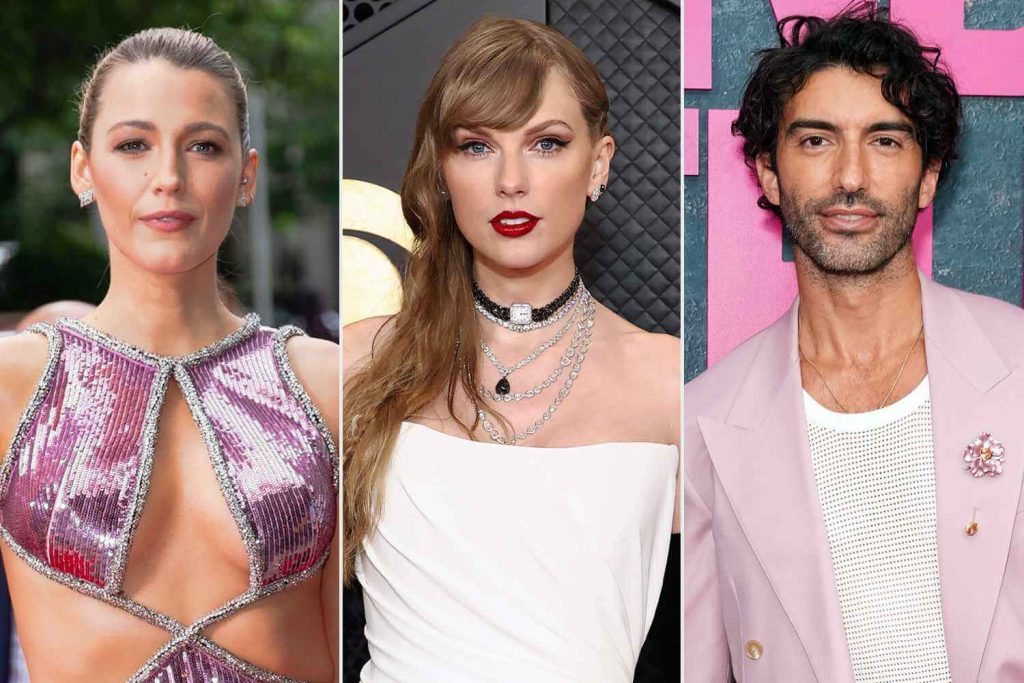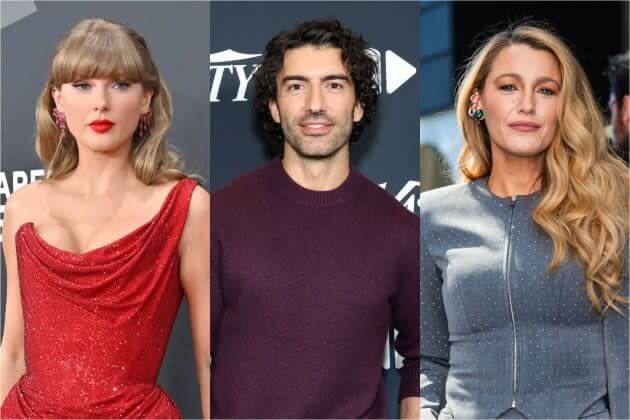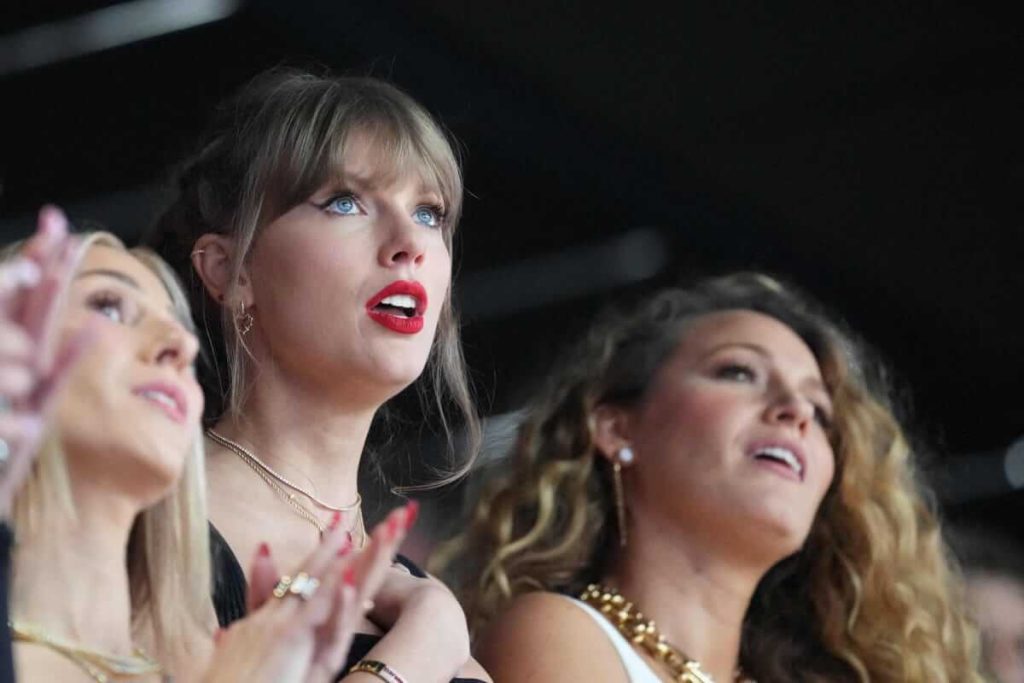World News
Taylor Swift: Celebrity legal storm rocks Blake Lively and Justin Baldoni’s ‘It Ends With Us’
The Subpoena That Sparked Headlines
In a stunning twist to an already turbulent legal battle, global superstar Taylor Swift has found herself unwillingly pulled into the courtroom drama involving her close friend Blake Lively and director Justin Baldoni. Swift was officially subpoenaed as a witness in the case concerning the production of the film It Ends With Us, an adaptation of Colleen Hoover’s bestselling novel. The legal team representing Baldoni served Swift with a subpoena, citing her alleged behind-the-scenes influence through her friendship with Lively and Ryan Reynolds.
Swift’s team reacted strongly, calling the subpoena a “publicity stunt” rather than a legitimate legal action. According to Swift’s representatives, her only involvement in the film was the licensing of her song My Tears Ricochet, which was featured in the movie. She had no role in the film’s production, script, or creative direction. Her representatives emphasized that she had not even watched the film until it was released, a fact they believe discredits any implication that she had sway over its creation.
The attempt to pull Swift into the lawsuit instantly caught the attention of both fans and media outlets. It raised important questions about the limits of celebrity associations, and whether friendships or artistic contributions can be manipulated into legal leverage. For Swift, who has carefully cultivated a brand of emotional honesty and artistic integrity, being forced into a legal dispute rooted in allegations of misconduct and retaliation is both reputationally risky and deeply personal.

The Lively-Baldoni Legal War: Behind the Claims
The heart of this complex legal case is the bitter fallout between Blake Lively and Justin Baldoni, two central figures in the production of It Ends With Us. In 2024, Lively filed a formal complaint against Baldoni, accusing him of sexual harassment and professional misconduct during the filming process. The allegations included claims of unwanted advances, inappropriate behavior on set, and a hostile work environment allegedly cultivated by Baldoni.
Baldoni, well-known for his public image as a socially conscious filmmaker and advocate for emotional vulnerability among men, quickly pushed back. In January 2025, he filed a countersuit against Lively, seeking an astronomical $400 million in damages. His claim included charges of defamation, breach of contract, and intentional interference with business relationships. Baldoni alleged that Lively’s actions not only damaged his personal reputation but also torpedoed the commercial prospects of the film.
One particularly incendiary element of Baldoni’s lawsuit was his indirect reference to Taylor Swift and Ryan Reynolds. In court documents, he included a text message in which Lively described Swift and Reynolds as her “dragons,” suggesting they supported her vision for the film. Baldoni’s team has used this reference as supposed proof that Lively marshaled her influential connections to manipulate the production process. This specific assertion is what ultimately led to Swift’s subpoena.
Swift’s Rebuttal: Defending Reputation and Boundaries
Swift’s camp wasted no time in publicly addressing the situation. In a carefully worded statement, her representatives lambasted the subpoena, arguing that it was more about sensationalism than the pursuit of truth. They criticized Baldoni’s legal strategy, pointing out that Swift had no official role in the film and was only marginally connected to the production through a music licensing deal. The idea that her name could be dragged into such a contentious legal showdown was, in their view, an overreach that exploited her celebrity status.
The statement further clarified that Swift did not visit the set, consult on the script, or engage in any creative meetings about the film. Her contribution ended at the signing of a licensing agreement. According to her team, any attempts to suggest otherwise misrepresent her actions and violate her boundaries as an artist uninvolved in the conflict.
This rebuttal was more than just a defense of legal non-involvement—it was a stand to protect Swift’s personal and professional boundaries. Known for maintaining a tight-knit circle of trusted collaborators and friends, Swift has long guarded her privacy despite her global fame. Being implicated in a lawsuit over events she had no control over represented not just a legal inconvenience, but an emotional betrayal that may have lasting effects on her public image and personal life.

Celebrity Entanglements and Their Fallout
As details of the case have continued to emerge, it’s become clear that this lawsuit is more than just a personal dispute—it’s a cautionary tale about the volatile intersection of celebrity friendships, power dynamics, and legal accountability. The emotional and professional stakes are sky-high. Lively and Swift’s friendship, once a celebrated example of female solidarity in Hollywood, has reportedly come under strain due to the ongoing case.
Sources close to Swift have claimed that she feels blindsided and hurt by her involvement. While she has not commented publicly, insiders suggest that the situation has driven a wedge between her and Lively. The two were last seen together in October 2024, and their lack of public appearances since has fueled speculation about a fallout. Whether their friendship can withstand the intense scrutiny and pressure remains to be seen.
Meanwhile, Blake Lively’s team has condemned Baldoni’s legal maneuvers as an attempt to “publicly shame and intimidate women.” They’ve pointed to tactics like suggesting tickets be sold for Lively’s deposition and questioning California’s victims’ rights law as signs of bad faith. According to them, the case isn’t just about a film dispute—it’s about power, retribution, and silencing women who speak up. Lively has stated she will testify when the trial begins in March 2026.
A Hollywood Storm Still Brewing
As the trial date approaches, interest in the case is only intensifying. Not only does it involve high-profile figures and emotionally charged allegations, but it also highlights how intertwined personal relationships and professional collaborations can become in the entertainment industry. For Taylor Swift, the episode serves as a stark reminder of the risks of public associations and the potential for even tangential involvement to spiral into legal chaos.
For now, all eyes are on what will happen next. Will Swift be compelled to testify despite her minimal involvement? Will the legal arguments focus more on celebrity names than the actual claims at hand? And perhaps most crucially, will this case influence how future collaborations are managed in Hollywood, especially among A-list stars?
No matter how the case unfolds, it has already had a cultural impact. It challenges long-held assumptions about the private nature of creative partnerships and shows just how quickly those relationships can be dragged into the public spotlight. As the entertainment world watches, the legal battle between Lively and Baldoni—and Swift’s involuntary role in it—remains a potent symbol of how fame, friendship, and the law can collide in the most unexpected ways.
From dragontrendtees


